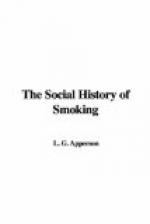After King William III was settled on the throne the sum of L600,000 was paid to the Dutch from the English exchequer for money advanced in connexion with his Majesty’s expedition, and this amount was paid off by tobacco duties. Granger long ago remarked that most of the eminent divines and bishops of the day contributed very practically to the payment of this revolutionary debt by their large consumption of tobacco. He mentions Isaac Barrow, Dr. Barlow of Lincoln, who was as regular in smoking tobacco as at his meals, and had a high opinion of its virtues, Dr. Aldrich, “and other celebrated persons who flourished about this time, and gave much into that practice.” One of the best known of these celebrated persons was Gilbert Burnet, Bishop of Salisbury from 1689, and historian of his own times. He had the reputation of being an inveterate smoker, and was caricatured with a long clay stuck through the brim of the shovel hat, on the breadth of which King William once made remark. The bishop replied that the hat was of a shape suited to his dignity, whereupon the King caustically said, “I hope that the hat won’t turn your head.”
Thackeray pictures Dryden as sitting in his great chair at Will’s Coffee-house, Russell Street, Covent Garden, tobacco-pipe in hand; but there is no evidence that Dryden smoked. The snuff-box was his symbol of authority. Budding wits thought themselves highly distinguished if they could obtain the honour of being allowed to take a pinch from it. Of Dr. Aldrich, who was Dean of Christ Church, Oxford, and who wrote a curious “Catch not more difficult to sing than diverting to hear, to be sung by four men smoaking their pipes,” an anecdote has often been related, which illustrates his devotion to the weed. A bet was made by one undergraduate and taken by another, that at whatever time, however early, the Dean might be visited in his own den, he would be found smoking. As soon as the bet had been made the Dean was visited. The pair explained the reason for their call, when Aldrich, who must have been a good-tempered man, said, “Your friend has lost: I am not smoking, only filling my pipe.”
John Philips, the author of “Cyder” and the “Splendid Shilling,” was an undergraduate at Christ Church, during Aldrich’s term of office, and no doubt learned to smoke in an atmosphere so favourable to tobacco. In his “Splendid Shilling,” which dates from about 1700, Philips says of the happy man with a shilling in his pocket:
Meanwhile, he smokes, and
laughs at merry tale,
Or Pun ambiguous or Conundrum
quaint.
But the poor shillingless wretch can only
doze
at home
In garret vile, and with a
warming puff
Regale chill’d fingers;
or from tube as black
As winter-chimney, or well-polish’d
jet,
Exhale Mundungus, ill-perfuming
scent.
The miserable creature, though without a shilling, yet possessed a well-coloured “clay.”




